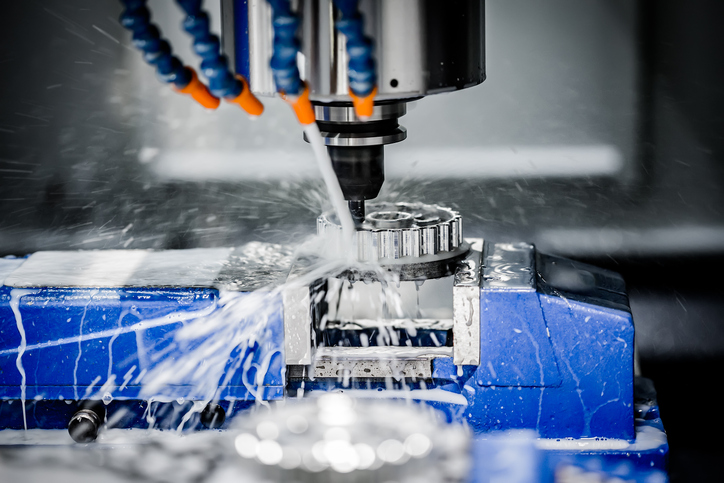If you’re in an industry like device manufacturing, aerospace, defense, or medical devices, then precision manufacturing is likely a top priority. For that, few manufacturing methods arise to the occasion like CNC machining. But finding the right supplier for your CNC parts isn’t straightforward. You need someone who can reliably meet your performance, durability, and quality standards. Making the wrong sourcing decision can lead to defects, delays, and added costs. In this guide, we’ll walk you through how to select the best CNC parts supplier for your needs.
Define Your CNC Part Requirements
First, in order to find a CNC parts supplier with the capabilities to meet your needs, you should have a clear definition of your requirements. This includes things like material selection and characteristics, precision and tolerances, part complexity and design considerations, and production volume.
Material Selection
Material selection is one of the most important decisions and it has a huge impact on the performance of your CNC parts. Metals like aluminum and stainless steel are common for a wide range of applications, while titanium and brass are critical for many specialized uses. In the case of plastics, materials like ABS, Delrin, PEEK, and polycarbonate offer numerous advantages including impact resistance, wear resistance, and thermal stability.
Whether you’re looking for metal or plastic CNC parts (or a combination of the two), be sure to consider factors like tensile strength, corrosion resistance, and heat tolerances based on the demands of your product. This will help you and your manufacturer narrow it down.
Precision and Tolerances
When it comes to precision, the level required can vary dramatically depending on the product and the industry. For example, aerospace and medical components require incredibly tight tolerances to ensure safety and functionality. On the other hand, general industrial applications or some consumer applications may allow for more flexibility.
Either way, it’s important to verify that your parts supplier has the capabilities to meet your specific tolerance requirements. Ask about things like the supplier’s machining capabilities, inspection equipment, and quality control processes. As a bonus, ensuring the supplier has experience with your industry’s specific requirements is always a good place to start.
Part Complexity and Design Considerations
CNC parts can range from simple shapes to complex geometries. If your design includes intricate details or multi-axis machining, it’s important to work with a supplier capable of handling the complexity. Again, look for a supplier with experience in advanced machining techniques such as 5-axis machining, Swiss turning, or electrical discharge machining (EDM).
It’s also a good idea to check for a supplier who offers design for manufacturability (DFM) or engineering support — these services can help refine complex designs for better efficiency and cost savings.
Production Volume
Whether you’re producing a handful of prototypes or scaling up for mass production, make sure your supplier can meet your volume needs. Some suppliers specialize in high-volume production, while others are better suited for small batch or prototype runs. Ask your potential supplier about their capability to adjust based on the scale of your project.
Identify Reliable CNC Machining Suppliers
Domestic vs. Overseas
When choosing between domestic and overseas suppliers, it’s important to consider the trade-offs. Domestic suppliers typically offer faster lead times and smoother communication, making them ideal for projects that require quick turnaround times and high precision. Overseas suppliers, on the other hand, can offer cost savings, but you might face longer lead times and potential communication barriers. The best option will likely depend on your needs and budget.
In-House Capabilities vs. Outsourced Machining
Not all suppliers handle every part of the CNC machining process in-house. Some may outsource specific tasks to third-party contractors. If you’re looking for tighter quality control and consistency, a supplier that handles everything internally can give you peace of mind. Managing all aspects of production in-house allows for better oversight, faster adjustments, and typically higher-quality results. Make sure to clarify whether your potential supplier relies on outsourcing and whether this impacts your specific needs.
Compare Pricing and Lead Times
When it comes to sourcing CNC parts, finding the right balance between price and lead time is crucial. It’s sometimes tempting to go for the most affordable option, but it’s always important to consider the factors that contribute to cost. High-performance materials and parts with complex geometries will come with a higher price tag — but you’ll also be getting parts that will perform at optimal levels for the long term.
Timelines are another important factor. Make sure you know how long it will take for raw materials to arrive, how long machining will take, and the time required for quality inspections and shipping. Understanding the full lead time will help you better plan for your project.
Evaluate Communication and Support
Finally, good communication is the foundation of a successful partnership with a CNC parts supplier. A responsive supplier who is quick to answer questions and keep you in the loop is invaluable. Look for companies that are proactive in offering feedback on your designs. This might include suggestions for improving the manufacturability of your parts (known as Design for Manufacturability or DFM). Additionally, some suppliers offer prototyping or small-batch production, which can be an excellent opportunity to test parts before moving to full-scale production.
Work with KAL Manufacturing for Your CNC Parts
At KAL Manufacturing, we’re here to help guide you through every step of sourcing your CNC parts. From engineering support and prototyping services to precision machining and sheet metal fabrication, our team is dedicated to meeting your unique needs.
Get in touch with us today to learn more about how we can support your project.

